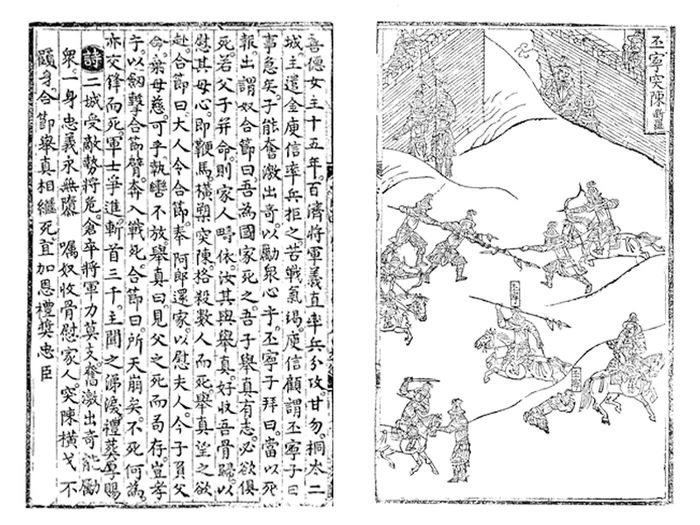(Translation) 2019 丕寧突陳
| Primary Source | ||
|---|---|---|
 |
Title | |
| English | ||
| Chinese | ||
| Korean(RR) | ||
| Text Details | ||
| Genre | ||
| Type | ||
| Author(s) | ||
| Year | ||
| Source | ||
| Key Concepts | ||
| Translation Info | ||
| Translator(s) | Participants of 2019 JSG Summer Hanmun Workshop (Intermediate Training Group) | |
| Editor(s) | ||
| Year | 2019 | |
Original Script
【詩】二城受敵勢將危. 倉卒將軍力莫支.
奮激出奇能勵衆. 一身忠義永無隳.
囑奴收骨慰家人. 突陣橫戈不顧身.
合節擧眞相繼死. 宜加恩禮奬忠臣.
Translation
Student Translation : Canan
善德女主十五年.
Queen Sŏndŏk was a Queen for fifteen years.
百濟將軍義直率兵分攻. 甘勿桐岑二城
General Ŭijik of Peakche, commanding his soldiers, attacked the two forts, Kammul and Tongjam, in division.
主遣金庾信率兵拒之.
The Queen dispells Kim Yusin to command the army and block [the attack].
苦戰氣渴.
[The army] had a hard battle and their qi was drained.
庾信顧謂丕寧子曰事急矣.
Kim Yusin turned around and said to Pi Nyŏngja: "The matter has become urgent"
子能奮激出奇.
"you rage up(?), pull something extra ordinary and so be able to motivate the crowd"
以勵衆心乎.
"and by doing so encourage the intention/moral [of the soldiers]"
丕寧子拜曰. 當以死報.
Pi Nyŏngja saluted and answered: "I have to answer with my death"
出謂奴合節曰. 吾爲國家死之.吾子擧眞有志.必欲俱死.
He left and said to his slave Hapchŏl: "I will die for my country. My son Kŏjin is ambitious. Certainly he wished to die together. "
若父子幷命. 則家人疇依.
If father and son die, then who will the household and cultivating the field depend on?"
汝其與擧眞. 好收吾骨歸. 以慰其母心.
"you should with Kŏjin collect my bones and return, in order to comfort the mind of Kŏjin's mother"
卽鞭馬. 橫槊突陳.格殺數人而死.
Promptly he whips his horse, and holding his long lance sideways harshly rushed forward. He went killed numerous people and died.
擧眞望之欲赴.合節曰.大人令合節.奉阿郞還家.以慰夫人.
Kŏjins saw it from afar and wanted to go [there]. Hapchŏl said: "The Master ordered me to wait upon you, and return home and comfort the lady of the house"
今子負父命.棄母慈.可乎
"Now a son turns his back [against] his fathers order, and abandons his mother's kindness. How can that be right?"
執轡不放.
He grasp the bridle, not letting go of it.
擧眞曰.見父之死而苟存.
Kŏjin said: "Seeing the death of my father and drift through life. how is that filial piety?"
以劒擊合節臂 奔入戰死.
With the sword he strikes Hapchŏl's arm. He rushed and entered the battle to die.
合節曰. 所天崩矣.不死何爲
Hapchŏl said: "That which [I thought] was the heaven collapsed. For what will I not die now?"
亦交鋒而死. 軍士爭進. 斬首三千. 主聞之涕淚. 禮葬厚賜.
He also went into the battle and died. The soldiers strove to advance [to the battle]. They were behead 3000. The Queen heard it and cried tears. She performed a ritual to bury the dead and generously bestowed [gifts].
- Discussion Questions:
(YO)Some translation-related points
善德女主十五年: the fifteenth year of Queen Sŏndŏk (647)
遣: to dispatch
氣: In the case of military context, we may assume 사기 士氣, i.e., morale.
丕寧子: I think Pinyŏng together is the name and Pi is not the last name.
子能奮激出奇 以勵衆心乎: 奮激 means rising to an action with an emotion of indignation, inspiration, or exasperation. So: "Can you rise to pulling something extraordinary, with which to encourage/inspire the heart of the crowd?"
有志: It can mean ambitious but in this case it can be close to "have a temper" or "be hot-blooded."
突陳: charge the [enemy] line
苟存: 苟 here is an adverb modifying 存 (exist, i.e., survive, stay alive), thus: "ignobly/shamelessly stay alive"
不死何爲: "Not die for what?" > For what should I not die?
斬首三千: [Those] beheaded were 3000.
--Also, I don't see the translation of the attached poem. Is it coming?